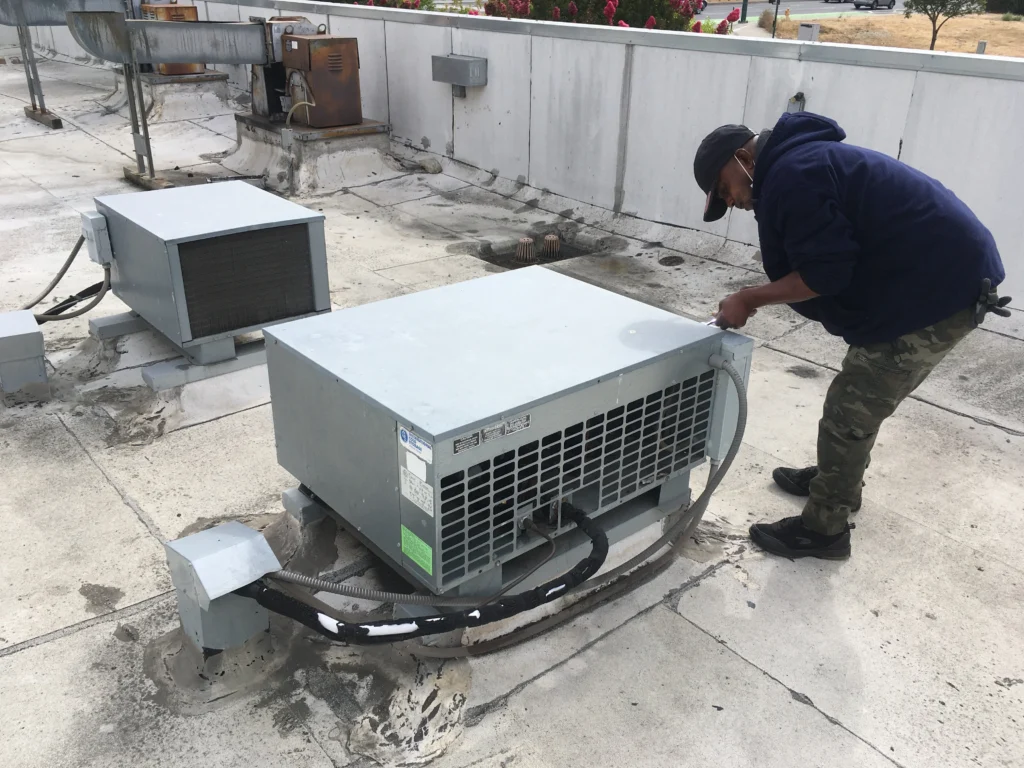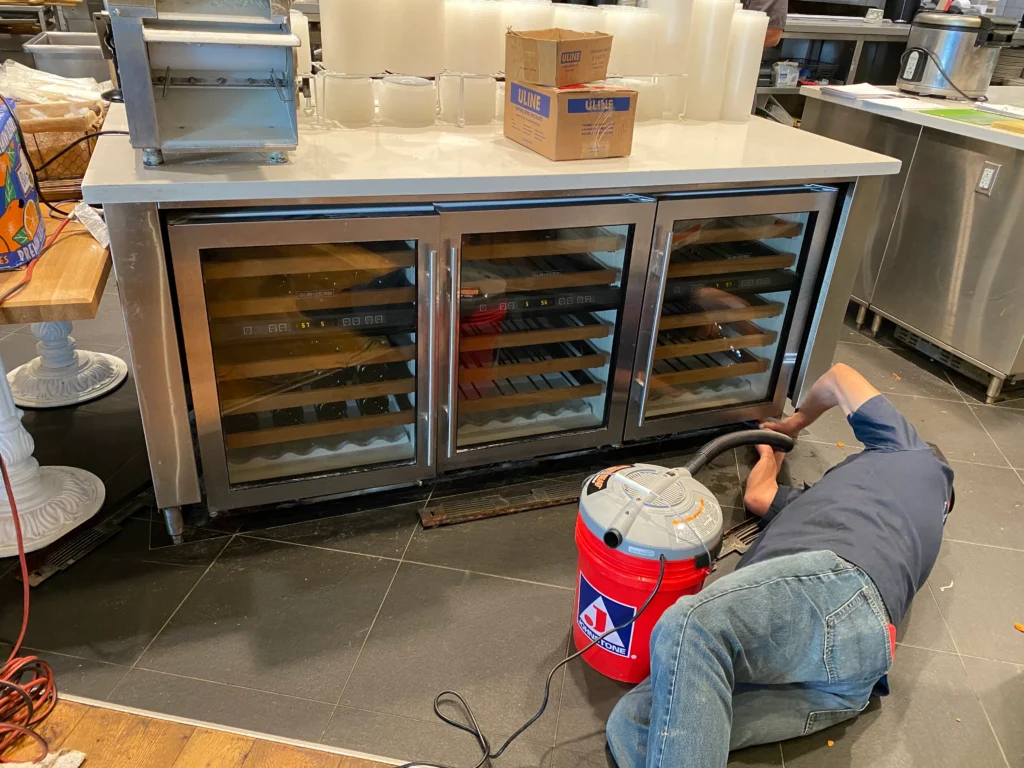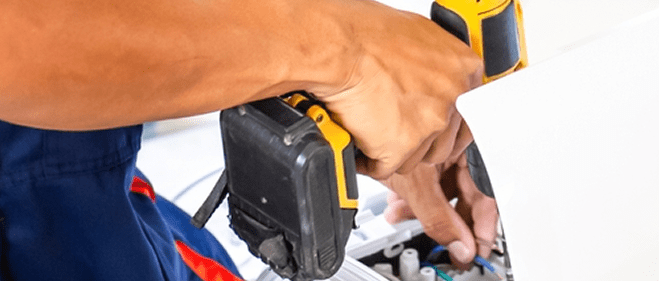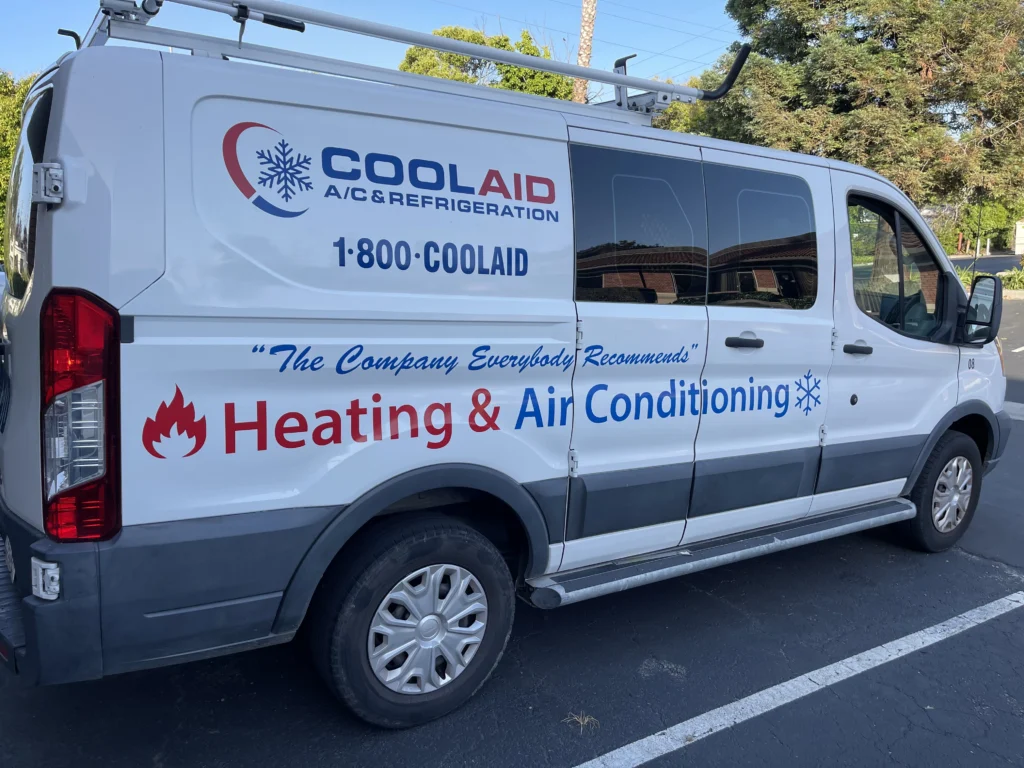Commercial Refrigeration Maintenance Services
Table of Contents
ToggleCommercial Refrigeration Maintenance Services
Your commercial refrigeration system is the backbone of your food service operation. Whether you run a bustling restaurant, a neighborhood grocery store, or a large-scale cold storage facility, your refrigeration equipment works around the clock to preserve inventory, maintain food safety, and protect your bottom line.
Yet many business owners treat refrigeration maintenance as an afterthought—waiting until equipment breaks down before calling for service. This reactive approach costs significantly more than preventive care while risking catastrophic failures that can destroy thousands of dollars in inventory within hours.
Professional commercial refrigeration maintenance transforms your cooling systems from potential liabilities into reliable business assets. This comprehensive guide reveals how routine maintenance saves money, prevents emergencies, and ensures your refrigeration equipment delivers peak performance year after year.

Preventative Refrigeration Maintenance for Businesses
Commercial refrigeration systems operate under demanding conditions that accelerate wear and stress components beyond their design limits. Restaurant kitchens expose equipment to grease, steam, and temperature fluctuations. Grocery stores require constant door openings that challenge system efficiency. Walk-in coolers work continuously to maintain precise temperatures for sensitive products.
These harsh operating environments make preventive maintenance essential for reliable operation. Professional maintenance programs address wear patterns before they cause failures while optimizing efficiency to reduce energy costs.
Why Routine Maintenance Matters for Efficiency & Longevity
Energy efficiency improvements from routine maintenance deliver immediate cost savings that often exceed service costs. Dirty condenser coils force compressors to work 25-40% harder to achieve the same cooling output. Regular coil cleaning restores efficiency while reducing electrical consumption substantially.
A typical restaurant with $2,000 monthly refrigeration energy costs can save $500-800 annually through proper maintenance. These savings compound over time while preventing the higher energy costs that neglected systems create.
Refrigerant system optimization ensures proper pressure levels and leak detection that maintains peak performance. Low refrigerant forces systems to run continuously while failing to maintain proper temperatures. Professional technicians identify and repair minor leaks before they become expensive emergencies.
Extended equipment lifespan protects your refrigeration investment through proper care and component replacement. Commercial refrigeration systems typically last 15-20 years with regular maintenance, compared to 8-12 years for neglected equipment. This extended life represents thousands in avoided replacement costs.
Compressor protection through proper maintenance prevents the most expensive refrigeration failures. Compressor replacement often costs 60-80% of new system prices, making prevention far more economical than replacement. Regular oil changes, refrigerant system cleaning, and electrical maintenance protect compressors from premature failure.
Motor and fan maintenance prevents mechanical failures that can cascade into major system problems. Proper lubrication, belt adjustment, and bearing replacement address wear points before they cause complete motor failure and expensive emergency repairs.
Food safety compliance through reliable temperature control protects your business from health department violations and potential lawsuits. Refrigeration failures that allow temperatures to rise above safe levels can contaminate entire inventories while creating liability exposure.
Temperature logging and alarm system maintenance ensure accurate monitoring of food storage conditions. Professional technicians calibrate sensors and test alarm systems to verify proper operation during temperature excursions.
What’s Included in Our Commercial Refrigeration Tune-Ups
Comprehensive system inspections examine every component that affects refrigeration performance and reliability. Visual inspections identify obvious problems while diagnostic testing reveals developing issues that routine observation might miss.
Condenser coil inspection and cleaning removes dirt, grease, and debris that reduces heat transfer efficiency. Restaurant equipment faces particularly heavy contamination from kitchen environments that require frequent attention. Professional cleaning restores heat transfer while reducing compressor workload.
Evaporator coil examination identifies ice buildup, refrigerant leaks, and airflow restrictions that compromise cooling capacity. Blocked evaporator coils prevent proper heat absorption while creating temperature fluctuations that affect food quality.
Electrical system maintenance ensures safe and efficient operation while preventing failures that can damage expensive components. Electrical problems cause 30% of commercial refrigeration failures, making regular inspection essential.
Connection tightening prevents arcing and overheating that can cause fires or equipment damage. Loose connections create resistance that wastes energy while generating heat that accelerates component failure.
Control system calibration ensures accurate temperature control and proper system cycling. Faulty thermostats can cause short cycling that wastes energy or allow temperatures to drift outside safe ranges.
Refrigerant system service maintains proper charge levels while detecting leaks that reduce efficiency and increase operating costs. Refrigerant loss forces systems to run continuously without achieving proper temperatures.
Leak detection using electronic sensors identifies small leaks before they become major problems. Early leak repair prevents refrigerant loss while avoiding the higher costs that emergency repairs create.
System pressure testing verifies proper operation while identifying potential failure points. Professional technicians understand normal pressure ranges and can detect developing problems through pressure analysis.
Common Refrigeration Issues We Help Prevent
Professional maintenance prevents the majority of refrigeration problems that force emergency service calls and create expensive repairs. Understanding common failure patterns helps demonstrate the value of preventive care versus reactive approaches.
Industry data shows that 75% of refrigeration emergencies could have been prevented through regular maintenance. The remaining 25% often result from age-related component failures that maintenance can predict and address during planned service windows.
Compressor Wear, Coil Buildup, and Thermostat Malfunctions
Compressor failures represent the most expensive refrigeration repairs, often costing $3,000-8,000 including labor and refrigerant replacement. These failures typically develop over months through gradual deterioration that maintenance can detect and address.
Oil contamination causes bearing wear and mechanical damage that leads to compressor failure. Regular oil analysis identifies contamination while oil changes remove harmful substances before damage occurs. Clean oil extends compressor life while maintaining efficient operation.
Electrical problems cause sudden compressor failures that often damage other system components. High voltage, power surges, and electrical imbalances stress compressor motors beyond design limits. Regular electrical inspection and surge protection prevent these catastrophic failures.
Refrigerant system contamination introduces moisture and debris that damage compressor internals. Proper system cleaning and filter replacement remove contaminants while preventing internal corrosion and mechanical wear.
Coil buildup problems reduce system efficiency while creating conditions that accelerate component wear. Dirty coils force compressors to work harder while failing to maintain proper temperatures consistently.
Condenser coil contamination prevents proper heat rejection that causes high head pressures and compressor overheating. Restaurant equipment faces grease contamination that requires specialized cleaning techniques and more frequent service intervals.
Evaporator coil ice buildup blocks airflow while reducing heat absorption capacity. Ice formation indicates airflow problems, refrigerant issues, or defrost system malfunctions that professional maintenance can identify and correct.
Thermostat malfunctions cause temperature control problems that affect food safety while wasting energy through improper system cycling. Faulty temperature controls account for 20% of refrigeration service calls.
Calibration drift allows temperatures to vary outside acceptable ranges without triggering alarms. Regular calibration ensures accurate temperature control while maintaining food safety compliance.
Control system failures can cause continuous operation or prevent systems from starting properly. Electronic controls are particularly sensitive to power quality issues and environmental conditions that regular maintenance addresses.
Sensor problems provide incorrect temperature readings that cause improper system operation. Dirty or damaged sensors require cleaning or replacement to restore accurate temperature monitoring.

Custom Maintenance Plans for Your Refrigeration Systems
Every commercial refrigeration application has unique requirements based on equipment type, usage patterns, environmental conditions, and business operating schedules. Standardized maintenance approaches fail to address these specific needs effectively.
Professional maintenance plans consider your specific equipment, operating environment, and business requirements to create optimal service schedules. This customization ensures appropriate attention while controlling costs through efficient scheduling.
Flexible Scheduling & Maintenance Agreements for Your Business
Tailored service frequencies match maintenance intervals to actual equipment needs rather than arbitrary schedules. High-use restaurant equipment requires more frequent attention than lightly loaded retail coolers. Environmental factors like kitchen heat and grease exposure also influence optimal service intervals.
Walk-in coolers typically require quarterly maintenance to address heavy usage and door seal wear. Reach-in coolers in busy restaurants may need monthly attention, while display cases in retail environments perform well with bi-monthly service.
Ice machines require monthly maintenance due to water quality issues and heavy contamination exposure. Neglected ice machines become breeding grounds for bacteria while producing poor-quality ice that can affect customer satisfaction.
Business hour coordination ensures maintenance work doesn’t disrupt operations or customer service. Most refrigeration maintenance can be performed during off-hours to avoid interference with food preparation or sales activities.
Weekend and early morning scheduling accommodates restaurants and food service operations that operate during standard business hours. Professional technicians work around your schedule to minimize operational impact.
Emergency access arrangements ensure technicians can access equipment during off-hours when failures occur. Established maintenance relationships include emergency contact procedures and building access coordination.
Comprehensive maintenance agreements provide predictable costs while ensuring consistent service quality. Fixed-price agreements eliminate surprise repair bills while guaranteeing prompt attention when problems develop.
Priority service scheduling gives maintenance customers preference for emergency calls and repair scheduling. This priority access reduces downtime when failures occur despite preventive maintenance efforts.
Parts and labor coverage options provide additional cost protection for aging equipment or critical applications. These comprehensive agreements can eliminate unexpected repair expenses while ensuring rapid problem resolution.
Seasonal preparation services ensure equipment is ready for peak demand periods. Summer preparation for cooling systems and winter service for heated display cases prevent failures during high-stress operating periods.

Emergency HVAC Issues We Fix
Your system may need urgent attention if you’re experiencing:
- No airflow from vents
- Furnace blowing cold air
- AC blowing warm air
- System won’t turn on
- Iced-over AC or refrigerant line
- Thermostat not responding
- Loud, unusual noises from the unit
- Weak airflow or poor indoor air quality
- Water leaks around the unit
- Burning smells or electrical odor
- Complete system failure
If you notice any of these signs, don’t wait. Contact COOL AID for immediate HVAC help.
Serving the Bay Area with Reliable Refrigeration Maintenance
The Bay Area’s diverse commercial food service industry creates unique refrigeration challenges that require local expertise and rapid response capabilities. From San Francisco’s bustling restaurant scene to Silicon Valley corporate cafeterias, refrigeration systems face demanding operating conditions.
Professional refrigeration maintenance services must understand local business needs while maintaining the technical expertise that complex commercial systems require. This combination of local knowledge and technical skill ensures optimal service for Bay Area businesses.
Trusted by Restaurants, Grocery Stores & Cold Storage Facilities
Restaurant refrigeration expertise addresses the unique challenges that food service operations face. Kitchen environments expose refrigeration equipment to heat, grease, and frequent temperature fluctuations that accelerate wear and require specialized maintenance approaches.
High-volume restaurants generate heavy contamination that requires frequent cleaning and component replacement. Professional maintenance programs account for these demanding conditions while scheduling service to minimize operational disruption.
Walk-in cooler and freezer maintenance ensures reliable temperature control for food safety compliance. Professional technicians understand health department requirements while providing documentation that supports regulatory compliance.
Ice machine service maintains sanitary conditions while ensuring adequate ice production for beverage service. Contaminated ice machines create health risks while inadequate ice production affects customer satisfaction.
Grocery store refrigeration systems require specialized knowledge of display case operation, defrost systems, and energy management. These complex systems integrate multiple components that must work together for optimal performance.
Display case maintenance ensures attractive product presentation while maintaining proper temperatures for food safety. Glass cleaning, lighting maintenance, and airflow adjustment optimize both appearance and performance.
Central refrigeration system service coordinates multiple components including compressor racks, condensers, and distribution systems. These complex systems require systematic maintenance approaches that address interdependent components.
Cold storage facility expertise addresses the unique requirements of large-scale refrigeration systems that operate continuously under heavy loads. These facilities require specialized maintenance approaches that ensure reliable operation for temperature-sensitive products.
Warehouse refrigeration systems face different challenges than retail applications including higher heat loads, longer operating cycles, and more demanding environmental conditions. Professional maintenance programs address these specific requirements.
Loading dock refrigeration requires attention to door seals, traffic patterns, and temperature recovery systems that maintain cold storage conditions despite frequent access. Proper maintenance ensures efficient operation despite challenging conditions.

Protect Your Business with Professional Refrigeration Maintenance
Your commercial refrigeration equipment represents a significant investment that requires professional care to deliver optimal performance and longevity. The cost of proper maintenance is minimal compared to the losses that equipment failures and energy waste create.
Don’t wait for refrigeration problems to disrupt your business operations or compromise food safety. Professional maintenance prevents most equipment failures while optimizing efficiency to reduce operating costs significantly.
Established maintenance relationships provide peace of mind through reliable service and priority response when problems occur. Professional technicians understand your equipment and business needs, enabling faster diagnosis and more effective repairs.
Ready to protect your refrigeration investment with professional maintenance services? Contact 1800coolaid.com today to learn about our comprehensive commercial refrigeration maintenance programs designed specifically for Bay Area businesses. Our certified technicians provide reliable service that keeps your equipment running efficiently while preventing costly emergencies. Don’t let refrigeration failures threaten your business success—invest in the professional maintenance your equipment deserves.
Frequently Asked Questions
How often should commercial refrigeration equipment receive maintenance?
Most commercial refrigeration systems require quarterly maintenance, though high-use restaurant equipment may need monthly service. Walk-in coolers, display cases, and ice machines each have specific maintenance intervals based on usage patterns and environmental conditions.
What does preventive refrigeration maintenance include?
Comprehensive maintenance includes condenser coil cleaning, evaporator inspection, refrigerant level checks, electrical system testing, thermostat calibration, and door seal inspection. We also provide detailed reports documenting system condition and recommended improvements.
Can regular maintenance really prevent most refrigeration breakdowns?
Yes, studies show that 75% of refrigeration emergencies result from problems that routine maintenance could have prevented. Regular service identifies developing issues before they cause failures, dramatically reducing emergency repair needs and associated costs.
Serving the Entire Bay Area
We proudly serve customers in:
